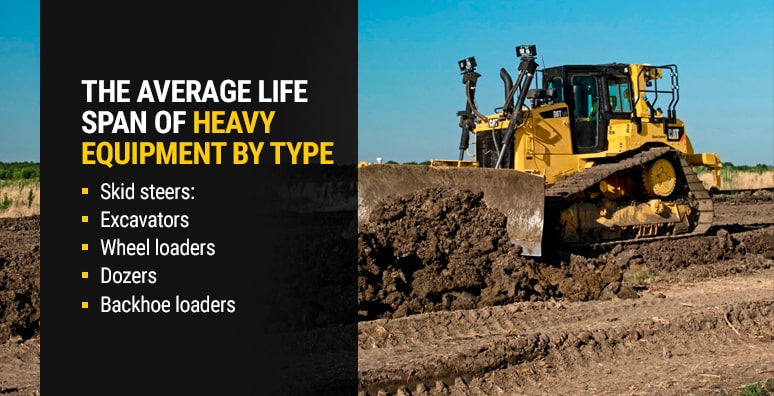Equipment is an investment, and you want to know the expected return to determine if it’s worthwhile. Various factors affect the working life of heavy equipment. Some of them are in your control, which means you can take certain steps to maximize your investment.
What Factors Impact the Life Expectancy of Construction Equipment?
Equipment life span depends on a range of factors, including:
- Environment: Machinery is susceptible to the elements. Extreme temperatures and contact with corrosive materials can both reduce life span. Outdoor equipment tends to have a shorter working life than indoor equivalents, though winterizing and protecting your machinery can add to its longevity.
- Maintenance and repairs: Timely service and routine maintenance increase the life expectancy of your equipment. You can leverage telematics and equipment management software to get the most out of your machinery.
- Operator behavior: Operators can manage heavy machinery in a way that increases fuel consumption and puts strain on the motor, system or brakes. Training and management software can help monitor and improve operator behavior.

The Average Life Span of Heavy Equipment by Type
Heavy equipment’s life span depends significantly on factors such as maintenance, overall care, and the severity of tasks they perform. However, industry standards provide a general benchmark for different machinery types:
Skid Steers
Skid steers, along with compact track loaders, typically have an average working life spanning 6,000 to 12,000 hours. Their longevity can be affected by factors such as the quality of maintenance, the intensity of the tasks performed, and the operator’s handling. Furthermore, using suitable attachments for specific jobs can help prolong a skid steer’s life span.
Excavators
Hydraulic excavators ordinarily round off their full-time production around the 9,800-hour mark, whereas mini excavators usually last for an average of 10,000 hours. Variables such as the operating environment, nature of tasks, and maintenance schedule can significantly impact an excavator’s life span. Regular inspections and promptly addressing any mechanical issues can result in a more extended, efficient operational life.
Wheel Loaders
Generally having an average working life of about 10 years or between 7,000 to 12,000 working hours, wheel loaders’ longevity is influenced by the intensity of labor, adherence to maintenance routines, and the operator’s proficiency. Usage in harsh conditions can limit their life span. Regular service and checking components like the tires, bucket, and hydraulics can help prolong their usable life.
Dozers
Bulldozers generally have an average life span of seven to 10 years. The undercarriages of bulldozers, like excavators, are more prone to wear and tear, directly influencing their working life. Therefore, keeping a close eye on the track system and implementing proactive maintenance can result in a significantly longer operational life.
Backhoe Loaders
Backhoe loaders typically last about 6,000 hours before needing components repaired or replaced. At approximately 8,500 hours, nearly 50% of parts may require servicing. Post this point, these machines generally have less than 3,500 hours left before they reach their working life’s end. Regular servicing, replacing worn-out parts, and ensuring optimal operating conditions can help keep them functional for longer.
Knowing the average lifespan of each equipment type can help plan for replacement or significant maintenance, optimizing budgeting and project planning. Always remember that regular maintenance and proper operating practices are the keys to maximizing any heavy equipment’s life span.
Maximize Your Machinery’s Working Life With H.O. Penn
The life span of machinery can fluctuate depending on your operators and maintenance schedule. The components you use for repair and replacements can also make a difference. Choosing an experienced partner for parts and service will help maximize your equipment’s working life.
H.O. Penn has over 100 years of industry experience and a stellar reputation. With several convenient locations, we’re the go-to Cat® dealer for New York and Connecticut. Call our team at 845-448-0018 or contact us online for service or recommendations.
